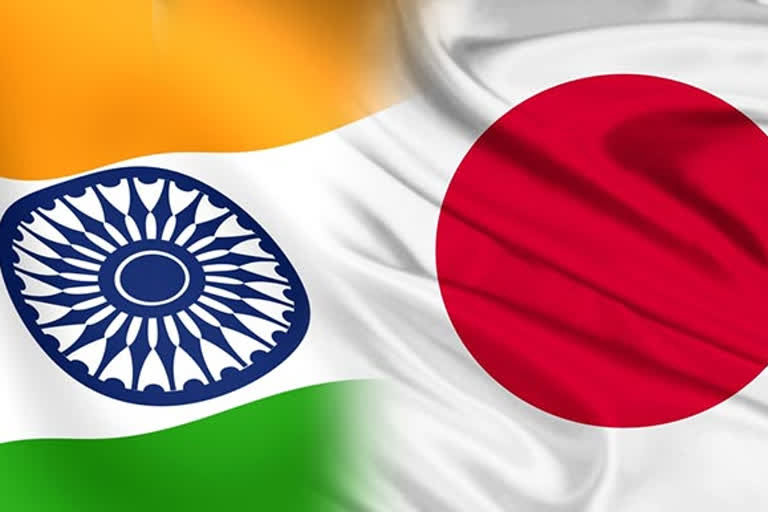New Delhi: India and Japan are surging ahead to bolster its already close strategic and trade ties and are looking at ways to strengthen the Quad, or the Quadrilateral Security Dialogue, comprising India, US, Japan and Australia in the face of Chinese aggression and cut trade dependency on China.
In yet another move, India Japan Australia is now fast-tracking supply chain cooperation in the Indo Pacific region, in an apparent bid to reduce trade dependence on China – a major trading partner for all three nations.
Although none of the countries that are partners of Quad has openly admitted to the anti-China coalition agenda of the Quad, the posturing is clear as daylight.
Now the question arises, whether the move by the countries will be influential in ending China’s dominance on trade. What impact it would likely have on China’s expansionist behaviour.
ALSO READ: The Abe effect on India, Japan ties: Raised to centre-stage
Speaking to ETV Bharat, Geethanjali Nataraj an independent trade economist and an expert on Indo-Japanese trade relations, said “The India Australia Japan Supply Chain pact will come into effect only a few months later but yes in the medium and long term it will certainly help these countries, especially India who have a huge trade deficit with China reduce their dependence on China.
“With respect to India’s sectors that have been impacted by supply chain issues arising out of the pandemic include pharmaceuticals, automotive parts, electronics, shipping, chemicals and textiles. India is trying to import less from China and trying to become ‘Atma nirbhar’ and also trying to trade more with the Middle East and Africa.
Therefore in due course the supply chain pact will certainly help reduce the dependency on China”, she added.
In the context of international trade, supply chain resilience is an approach that helps a country to ensure that it has diversified its supply risk across a clutch of supplying nations instead of being dependent on just one or a few –in this case, dependent on China.
Renowned economist Dr NR Bhanumurthy said, “One of the biggest innovation in the last 10 years in the trade front is not really about trading commodities but it is the global value chain and linkages that have been established over the years and are an important aspect of international trade.
Even though we have issues with China in terms of politics as well as geopolitical issues, but we need to compete with Chinese. Improving the supply chain with Japan, the US, Australia is the only option left for us if India wants to reduce dependency on China”.
He says that more Japanese investment in India will facilitate the growth of both countries.“If at all India have to depend less on China, there is no option other than improving trade and investment relationship among the four countries. In the context of Chinese aggression, the trade relation must increase, he reiterated.
ALSO READ: India-Japan ties not against any third country: Expert
According to the report by Nikkei Asian Review the three countries-India, Japan, and Australia called on other countries in the region who share the same vision to join the initiative.
Japan has already launched cooperation with the ASEAN over supply chains and is expected to explore ways to combine the two initiatives.
Apart from Japan leading the deal, in recent times India has had growing concerns about supply chain dependence on China combined with Chinese border skirmishes, while Australia is being hit by Chinese trade restrictions. All three countries are very much “China trade dependent”. They also have a direct interest in the stable Indian Ocean and the Pacific Ocean.
Moreover, Japan is eyeing on to offer incentives to companies shifting base from China to India. As per Nikkei Asian Review, Japanese manufacturers will now be eligible for subsidies if they shift production out of China to India or Bangladesh, in an expansion of a government program aimed at diversifying the country’s supply chain.
“Japan and the US expect India to act as a counterbalance to China in the region. In fact, the QUAD countries (India Australia, Japan and US) and Quad plus including South Korea are strong allies of India and expect India to play a strong role in curbing the hegemonic intentions of China in the region. As a result, one can only foresee the further strengthening of the ties between Japan and India”, Nataraj adds.
Read: Teesta in the shadows of India-Bangladesh vaccine talks?
It is pertinent to note that the centre has approved for signing a pact between India and Japan aimed at increasing India’s exports of textiles and apparel to the Japanese market and to boost cooperation in the textiles sector.
It will help identify areas for optimizing the benefit of the Comprehensive Economic Partnership Agreement signed between India and Japan.
Hence, it is expected that the pact with Japan will provide an alternative market to India to safeguard its exports and also look for opportunities to import cotton yarn and textiles from Japan and reduce its dependence on China.
According to the latest information, the FDI from Japan in India including investments in startups, in the financial year 2018-19 stood at just US$1.6 billion, this has increased to US$3.2 billion in 2019-20. According to the latest data, 12 Indian unicorns with a combined value of over US$59 billion have received Japanese investment.
Read: A Biden White House unlikely to roll back US policies on India, China: Experts



